Then, Supergirl #9 hit, and things actually clicked. In the span of one issue, Joe Kelly gave Supergirl more personality and more of a place in the Superman family than in the previous fourteen (excluding, of course, her appearances in LSH which have been universally well-done). How did he accomplish such a monumental task?
By contrasting Supergirl with the other members of the Superman family, something he is qualified to do, having written extensively for Superman and Superboy. Supergirl is struggling to define who she is, to find her place in the world, and more specifically, her place among those who wear the 'S'. From the cover to the last page, we see Kara trying to define herself with reference to her Super-kin.
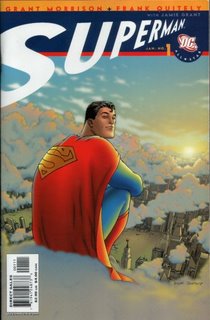
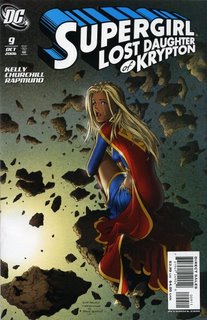
Inside, Supergirl slouches in a chair, dressed in Superboy's black t-shirt, smoking a cigarette as she bares her soul to Captain Boomerang (who, for some reason, is mostly obscured throughout the issue, to the point where I didn't even catch that it was him until I read it on another blog).
Kara sits in a manner that is blatantly masculine, displaying already a sense of alienation, of discomfort with her gender identity. She begins and quits smoking in the span of two pages, as part of an experiment to discover what works for her, what can be incorporated into her identity. Upon hearing her sudden decision to quit, Capt. Boomerang remarks that he did the same last year, but it was hard:
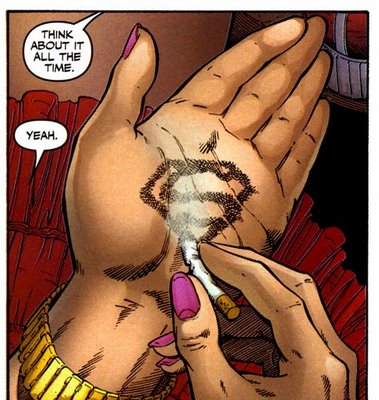
The issue moves into a flashback, the first of many, in which Supergirl and Power Girl are fighting over this issue of quitting. It does well to remember that Supergirl and Power Girl are versions of the same character; in essence, Supergirl is grappling with herself, struggling with the responsibilities of the 'S' and what it means to her life. She's been told from day one who she should be and what she should do (as she discusses on the first page), and now she's trying to figure it out for herself.
This first flashback scene sets the stage for the ones that follow, in that it shows Supergirl in contrast to another character.
An aside: Power Girl deserves an S-shield. Etch it into the golden clasp of her cape or put one on her belt buckle, but she deserves one someplace.
Anyway, the next flashback depicts Supergirl and Wonder Girl mourning the loss of Paradise Island, and a flashback-within-a-flashback demonstrates how different WG and SG were from the Amazons. This serves to demonstrate that Supergirl was an outsider among the Amazons as well, despite being raised with them for awhile. In this matter however, she wasn't alone, and her relationship with Cassandra will become more important later.
Aside #2: Diana, Themyscira, Conner, Robin...Wonder Girl lost a lot in Infinite Crisis, more than most. Is it any wonder she's so moody and fragile these days?
Our next flashback is the most important of the five, as Supergirl visits the Kent farm. This scene--and I never thought I'd say this about this Supergirl series--is brilliant. Kelly contrasts Jeph Loeb's Supergirl with Superman by referencing Jeph Loeb.
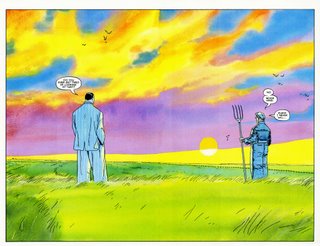

The scene moves inside, into Conner's room, where Kara picks up his black t-shirt. There, she asks a fantastic question:

In the fourth flashback, we see that Kara's Kryptonian home life might have been even weirder than previously thought, as Zor-El asks for her assistance to kill a person who we assume to be Alura (Kara's mother). Through this, and through the prior revelation that she was meant to kill Kal-El, we find that Supergirl is fighting her Kryptonian destiny as well as her terrestrial one, fighting against the 'S' both in terms of what the Superman family expects of her, and what her biological family expected of her.
The fifth is a scene with Batman, in which she demonstrates a greater camaraderie with him than with her other 'parents,' neither of whom even appear in the book. This, coupled with her asking Owen to pass a message along to Nightwing, suggests that Kara feels more comfortable with Batman's squad of loners and orphans than with her own superheroic family.
She prepares to leave Owen, in the classic superhero fashion, leading to this scene:
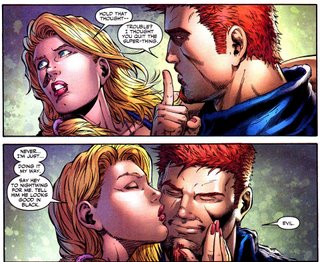
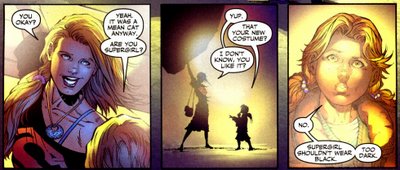
All that, and there's still time for a scene where Kara bonds with a grieving Cassie, passing Superboy's shirt to its more rightful owner.
So by the end of the issue, we have a Supergirl who feels like an outsider to her family, to her Amazon peers, to her adopted planet, and to her homeworld. This feeling is naturally underscored by the fact that she's spent the whole issue with an Outsider, one who occupies a similar position in terms of people's expectations. Both Kara and Owen are trying to define themselves as separate people from their families, but both also carry the weight of destiny and legacy on their shoulders. It's no wonder, then, that Supergirl would find herself more at home with Batman than Superman.
Of course, part of that is that Supergirl lacks Clark's sense of humanity, his ties to the planet. Kara has no civilian identity, she hasn't lived with the Kents, her only friends are other superheroes. With Superboy dead, she finds herself trying to fill his shoes (or shirt), but she finds that his life is no more a perfect fit to her than the life that was thrust upon her. It's really a shame that he's gone; a superpowered teenager trying to live up to a perfect legacy, with a history of identity crises and a secret darkness passed down genetically? They'd have oodles to talk about.
Yet it's clear from this issue that she's not just a clone of Superboy. She's facing similar problems, but unlike Superboy, she really doesn't have a support structure in place to help her solve them. She's a teenager, trying to find her place in the world, trying to fight her father's legacy of death while trying to define her place in her cousin's legacy of hope. She may have floundered for a couple of years, bouncing from personality to personality, expectation to expectation, but it's clear that she's finally made a decision about where she's going to go with her life, and her 'S'. With Wonder Girl and Captain Boomerang, she has the beginnings of a supporting cast, and hopefully she'll be slipping on a pair of glasses sometime in the near future. Then again, maybe not. What we have here is a Supergirl who doesn't fit so easily into a cape, a teenager who's still trying to figure out who she is, and not just who everyone wants her to be.
Do you see all that text? I couldn't have written that much analysis of any previous issue of this series. I'd be hard-pressed to find that much meaning in Loeb's whole arc. This is the first issue of Supergirl since David's run ended where I could consider using words like "subtle" and "nuanced." There's a lot of rough edges, to be sure, but this Supergirl has finally become someone I can care about. Even if Kara hasn't quite found her identity yet, the audience has, and watching her come into that identity should be an interesting trip. Looks like Supergirl is saved from the axe for another month.

8 comments:
This is absolutely brilliant. I hadn't made the connection of the cover to the Superman one, even with that sitting here atop the To Read stack. And you've captured a lot of what I felt upon reading it and couldn't quite put into words. Thanks for a great analysis.
--Shelly
Excellent analysis.
Makes me wish maybe I'd bought and read it instead of just picking it up and giving it a super-super-quick skim at the shop (then again, what can you expect after the Kandor arc, which was the first time I'd actually bought any Supergirl comics).
But I appreciate your taking the time to dissect it. Maybe I'll give it another look next time I'm in.
Excellent, excellent analysis, Tom. I smiled as I read it.
Thanks for the kind words, folks. I'm glad it didn't come off as incoherent as I'd feared.
Let's just hope Kelly can maintain this level of depth.
Well said. My own review was a bit more negative, because I still can't get over the weird Kandor arc.
But it did feel like a step in the right direction, and your post articulated those feelings for me quite well.
Great post!
It's nice she's finally got a personality but it's still doesn't gel with the personality of the Supergirl I'm reading over in Legion. It's all very confusing.
(As an aside, I don't think Power Girl should ever wear the S. It's not that she doesn't deserve it, it's just that she doesn't want it. She could have had it from the beginning, after all, but it a big part of her early appearances was how she wanted her own identity and not stand in the shadow of her father-figure.)
True enough, but the same can be said for Steel, who dropped the 'S' as he forged his own identity, then took it up again with Superman's blessing. I think PG's developed a distinct enough personality; someone as confident as Karen shouldn't have a problem with being in Kal's shadow, and she deserves a family.
Of course, she could adopt Kal-L's symbol, as the last member of that line, for different reasons altogether.
As far as Supergirl goes, it seems that LSH Supergirl is suffering from a bit o' the dissociative disorder. While I could see her being the SG from the missing year, I imagine that the combination of losing a home, losing Conner, losing Themyscira, losing Superman for a year, and losing Argo (as I'm sure is coming), then losing her entire time period, might be enough to cause someone to snap and go off to la-la land.
You put eloquance to my scattered thoughts. Very enjoyable. Thank you.
Post a Comment